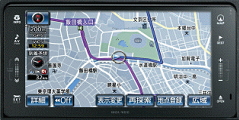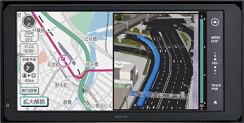|
Tokyo, Japan. November 8, 2011 - eSOL, a leading developer of real-time embedded software solutions,
announced today that the eT-Kernel Multi-Core Edition real-time OS is being
used in multiple genuine Toyota car navigation systems, including "NHZA-W61G",
developed by Aisin AW Co., Ltd., and "NSDD-W61" developed by
Denso Corporation. The NHZA-W61G system received the 2011 Good Design Award
presented by the Japan Institute of Design Promotion. The eBinder integrated
development environment (IDE) was used to develop some of applications
running on those systems. The eBinder IDE can be used for real-time software
development on both single-core and multi-core processors.
Car navigation systems are continuously evolving to make driving safer,
reduce environmental burdens, and improve driver and passenger comfort.
Car manufacturers have implemented more and more functions in their new
car navigation systems, enhancing connectivity and communication, and coordinating
with electric vehicle control systems, other vehicles' systems, transportation
infrastructures, cloud information centers, and other electrical devices
such as mobile phones.
Toyota's Tier 1 automotive suppliers selected the eT-Kernel Multi-Core
Edition RTOS because the RTOS enables the rapid implementation of new features
and functions while maintaining excellent real-time performance and high
reliability. It also meets the strict requirements of connectivity-related
applications such as collaboration with vehicle control systems and inter-vehicle
communications.
The eT-Kernel Multi-Core Edition, released in 2006, is an advanced RTOS
for multi-core processors, which advanced multifunction car navigation
systems often require.
The exclusive Blended Scheduling(R) technology used in eSOL's eT-Kernel
Multi-Core Edition RTOS provides software developers with the scalability
and high-throughput efficiency of SMP, along with the more deterministic
and real-time characteristics and software reusability of AMP in a single
RTOS. When used together with eSOL's optional Memory Partitioning, the
Multi-Core Edition RTOS can detect any memory access violation so that
the quality of multi-core systems is assured even when integrating independent
systems with different levels of reliability on a multi-core processor.
eT-Kernel Multi-Core Edition also features individual module loading and
fast boot capability. Individual module loading helps navigation software
developers to easily update and add applications. Fast booting enables
fast restart of car navigation systems and eliminates users' frustration.
eSOL's eBinder IDE provides software developers high-quality development
tools and functions, enabling them to create multi-core software in less
time and at lower cost.
"We have enhanced and improved the eT-Kernel RTOS and the eBinder
IDE to meet strict requirements for quality, performance, and functions
for in-vehicle systems since Denso selected our RTOS and IDE for their
car navigation systems in 2005." said Nobuyuki Ueyama, Executive Vice
President of eSOL. "Since then, eT-Kernel and eBinder have been adopted
in many in-vehicle infotainment systems. We also offer first-rate professional
services. Because of our experience and knowledge of embedded systems development
for various OSes, we are able to provide strong support for in-vehicle
system development."
|



